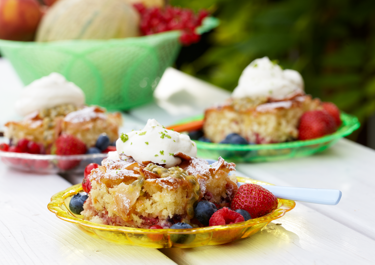Coconut cake

A wonderfully delicious coconut cake, served with fresh berries and tangy lime zest which balances the sweetness of the cake nicely.
Ingredients
|
Butter
|
150 g |
|---|---|
|
Eggs
|
3 |
|
Caster sugar
|
180 g |
|
Salt
|
1 pinch |
|
Desiccated coconuts
|
100 g |
|
Flour
|
120 g |
|
Baking powder
|
1 tsp |
|
Raspberries, blueberries, strawberries in pieces
|
2 dl |
|
Coconut chips
|
35 g |
Lime cream:
|
Double cream
|
300 ml |
|---|---|
|
Icing sugar
|
45 g |
|
Lime, grated peel and juice
|
1 |
Instructions
Coconut cake
How long does coconut cake last?
Like most cakes, your coconut cake will keep in the fridge for up to a week, depending on the temperature and how well you cover the cake. Remember that your fridge will not only chill but also dry out the cake, which is why proper covering is necessary. To freeze the cake, start by freezing it on a freezer safe platter until firm. Then wrap the cake in layers of plastic wrap followed by tin foil, securing with freezer tape to protect the cake from freezer burn. This should keep the cake for up to four months. Defrost for about four hours at room temperature before serving.
Can you make coconut cake without butter?
Not everyone can enjoy butter in their cake. But lactose intolerance or a milk protein allergy shouldn't stop you from relishing this coconut treat. Try substituting the butter with coconut oil. This is a classic trick for turning almost any cake recipe dairy-free. Coconut oil can often substitute for butter at a 1:1 ratio. In this case, simply add 150 g coconut oil instead of butter. The oil will of course alter the flavour and texture of the cake somewhat.
Try making individual size mini coconut cakes
Looking to add an extra touch of personal luxury to your coconut cake – perhaps to serve as dessert at dinner with friends or family? Try pouring the batter in a muffin tin before baking. You'll get neat little coconut cakes that look amazing when topped with the lime cream. This method maximises the caramelised crust on each bite, which can only count as a huge benefit. Just make sure not to pour too much batter in each muffin cup. You want the cakes to be the right thickness and properly cooked through.
A moist cake to serve with coffee
You may have tried coconut sponge cake before. This is different. This cake is absolutely packed with coconut, showcasing the characteristic tropical-nutty flavour loved by many. The desiccated coconut also binds with the butter and eggs to render the cake exquisitely moist. If you're a coffee lover, this may very well become your new favourite afternoon treat. Best enjoyed in the company of someone you like or want to get to know better.
Make the most of your desiccated coconut
Did you buy a value pack of desiccated coconut for this recipe? Good on you! You can sprinkle it on almost any cake, pudding, or dessert to add a bit of texture and mild nuttiness. But why stop at the sweet stuff? Try gently toasting the desiccated coconut in the oven or in a pan. This brings out deeper, richer flavours in the tiny flakes. Then use the coconut to garnish any curry or rice dish. Or simply leave it on the table and let people sprinkle according to their taste. Toasted coconut can also serve as the perfect topping for a salad, bowl, or your breakfast muesli.
Add an extra exotic twist
To make the cake even more exotic, try adding some freshly sliced pineapple or mango on top of your cake. This will go great with your coconut cake.








